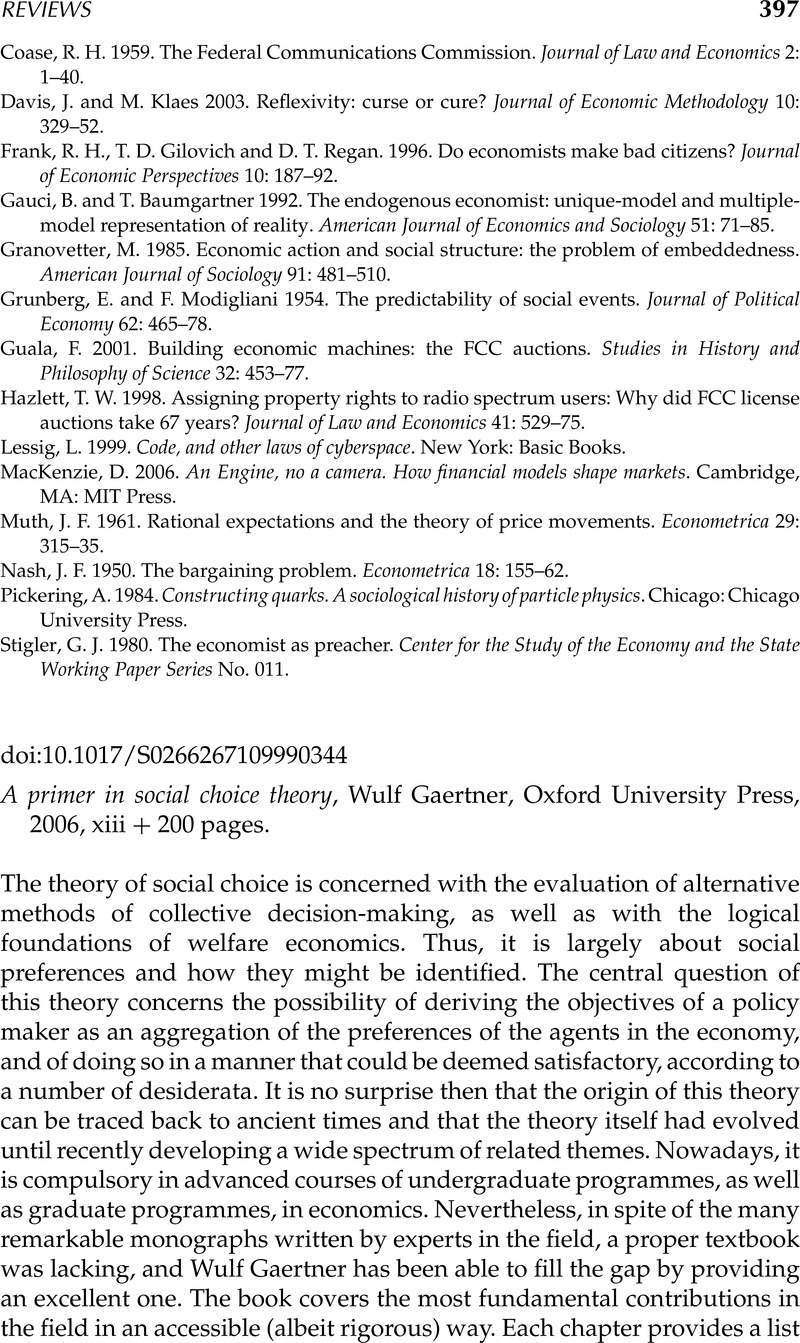No CrossRef data available.
Article contents
A primer in social choice theory, Wulf Gaertner, Oxford University Press, 2006, xiii + 200 pages.
Published online by Cambridge University Press: 10 November 2009
Abstract
An abstract is not available for this content so a preview has been provided. Please use the Get access link above for information on how to access this content.

- Type
- Reviews
- Information
- Economics & Philosophy , Volume 25 , Issue 3: Economics and Philosophy on Ambiguity Aversion , November 2009 , pp. 397 - 403
- Copyright
- Copyright © Cambridge University Press 2009
References
REFERENCES
Austen-Smith, D. and Banks, J. 1999. Positive political theory I: collective preference. Ann Arbor, MI: University of Michigan Press.Google Scholar
Austen-Smith, D. and Banks, J. 2005. Positive political theory II: strategy and structure. Ann Arbor, MI: University of Michigan Press.CrossRefGoogle Scholar
Bossert, W. 1995. Redistribution mechanisms based on individual characteristics. Mathematical Social Sciences 29: 1–17.CrossRefGoogle Scholar
Cappelen, A., Drange Hole, A., Sorensen, E. and Tungodden, B. 2007. The pluralism of fairness ideals: an experimental approach. American Economic Review 97: 818–27.CrossRefGoogle Scholar
d'Aspremont, C. and Gevers, L. 1977. Equity and informational basis of collective choice. Review of Economic Studies 46: 199–210.CrossRefGoogle Scholar
Fleurbaey, M. 2008. Fairness, responsibility, and welfare. Oxford: Oxford University Press.CrossRefGoogle Scholar
Fleurbaey, M. and Maniquet, F. 2005. Compensation and responsibility. In Handbook of social choice and welfare, vol. 2, ed. Arrow, K., Sen, A., and Suzumura, K.. Amsterdam: North-Holland.Google Scholar
Gajdos, T. and Kandil, F. 2008. The ignorant observer. Social Choice and Welfare 31: 193–232.CrossRefGoogle Scholar
Herrero, C., Moreno-Ternero, J. and Ponti, G. 2006. On the adjudication of conflicting claims: an experimental study, Social Choice and Welfare.Google Scholar
Konow, J. 2000. Fair shares: accountability and cognitive dissonance in allocation decisions. American Economic Review 90: 1072–91.CrossRefGoogle Scholar
Moreno-Ternero, J. and Roemer, J. 2008. The veil of ignorance violates priority. Economics and Philosophy 24: 233–57.CrossRefGoogle Scholar
Moulin, H. 2003. Fair division and collective welfare. Cambridge, MA: MIT Press.CrossRefGoogle Scholar
Thomson, William. 1999. The theory of fair allocation. Princeton, NJ: Princeton University Press.Google Scholar
Yaari, M. and Bar-Hillel, M. 1984. On dividing justly. Social Choice and Welfare 1: 1–24.CrossRefGoogle Scholar


